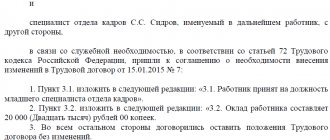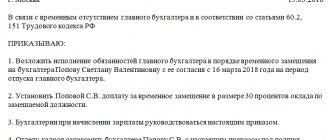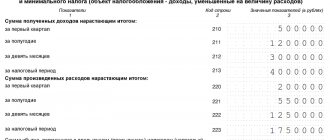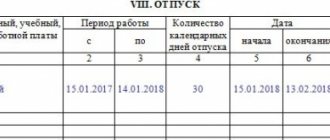Letter of the Ministry of Labor and Social Protection of the Russian Federation No. 14-2/B-935 dated October 18, 2017
Is it legal to indicate in the apprenticeship contract that in the event of failure to complete a specified period of time after training, the employer withholds part of the training costs upon dismissal in proportion to the period of non-service - without the consent of the employee?
The need to train employees for their own needs is determined by the employer. The conditions and procedure for their training are established by a collective agreement, agreements, and employment contract (Parts 1, 2, Article 196 of the Labor Code of the Russian Federation).
The organization has the right to conclude a student agreement (Part 2 of Article 197, Article 198 of the Labor Code of the Russian Federation):
with a job seeker;
Articles on the topic (click to view)
- What to do and where to go if you are not paid upon dismissal
- What to do if you are laid off at work
- What to do if the employer does not want to fire at his own request
- What to do if the date of the dismissal order is later than the date of dismissal
- What to do if the employer does not give the work book after dismissal
- What to do if you didn’t work officially, you were fired, you didn’t get paid
- What is the employer obliged to give the employee on the day of dismissal?
with your employee - for on-the-job or off-the-job training. In this case, the student agreement is additional to the employment contract.
The student agreement is concluded for the duration of the training in writing in two copies, and contains (Part 1 of Article 199, Article 200 of the Labor Code of the Russian Federation):
an indication of the qualifications acquired by the student;
the employer's obligation to provide the employee with training opportunities;
amount of payment (scholarship) during the apprenticeship period;
the employee’s obligation to undergo training and, in accordance with the qualifications obtained, work under an employment contract with the employer for the period established in the apprenticeship contract.
Reimbursement of training costs to the employer
If a student, at the end of his apprenticeship, does not fulfill his obligations under the contract without good reason (for example, he quits of his own free will before the deadline established by the apprenticeship contract), he, at the request of the employer, reimburses him for expenses in connection with the apprenticeship (Part 2 of Article 207 of the Labor Code of the Russian Federation) .
Expert opinion
Novikov Oleg Tarasovich
Legal consultant with 7 years of experience. Specializes in criminal law. Member of the Bar Association.
Labor legislation does not contain an exhaustive list of valid reasons for non-fulfillment of an apprenticeship contract. In order to avoid conflict situations, it is advisable to establish a list of such reasons in the student agreement (Part 2 of Article 199 of the Labor Code of the Russian Federation).
The employer has the right to issue an order/instruction to collect compensation from the employee not exceeding his average monthly earnings no later than one month from the date of the final calculation of the amount of damage from non-processing.
Accounting and taxation for reimbursement of training costs
An employer's payment for training an individual in a Russian organization carrying out educational activities, or in a foreign organization that has the right to conduct educational activities, is not subject to personal income tax and insurance contributions (clause 21 of Art.
217, sub. 12 p.
1 tbsp. 422 Tax Code of the Russian Federation, sub.
13 clause 1 art.
20.2 of the Federal Law of July 24, 1998 No. 125-FZ).
For profit tax purposes, expenses for training employees in Russian educational organizations, scientific organizations or foreign educational organizations that have the right to conduct educational activities are recognized. These are other expenses associated with production and sales (subclause 23, clause 1, article 264, subclause 3, clause 7, article 272 of the Tax Code of the Russian Federation).
The cost of training for persons who do not work in the organization can be taken into account in “tax” expenses if they have entered into agreements with the organization providing for the obligation, no later than three months after completing the training paid for by the organization, to conclude an employment contract with it and work for it for at least one year (Clause 3 of Article 264 of the Tax Code of the Russian Federation).
Reimbursement of training costs due to the organization is included in non-operating income upon recognition by the employee of his obligation (clause 3 of Article 250, subclause 4 of clause 4 of Article 271 of the Tax Code of the Russian Federation).
In accounting, the costs of training employees and applicants are classified as management expenses (clauses 4, 5, 7, clause 8 of PBU 10/99 “Organization expenses”, approved by order of the Ministry of Finance of Russia dated May 6, 1999 No. 33n). And the amount reimbursed to the organization is included in other income in the month the employee recognizes his obligation to partially reimburse training expenses (clauses 7, 10.2, 16 PBU 9/99 “Income of the organization”).
Example.
Accounting for compensation under a student agreement
DEBIT 60 CREDIT 51
DEBIT 26 (44) CREDIT 60
To collect compensation from an employee:
DEBIT 73 CREDIT 91-1
DEBIT 50 (51, 70) CREDIT 73
The fixed-term employment contract stipulates that it is concluded for the period of temporary incapacity for work of the main employee. After the sick leave ended, the main employee immediately went on vacation. When to terminate a fixed-term employment contract?
performance by the employee of state or public duties;
medical examination (examination);
advanced training while away from work, etc.
In this case, the basis for terminating the employment relationship will be the expiration of the employment contract - that is, the return to work of an absent employee, confirmed by a working time sheet, regardless of the further regime of his working hours (Part 3 of Article 79 of the Labor Code of the Russian Federation). There is no need to warn a temporary employee about dismissal three calendar days in advance.
This is important to know: Can a mother of many children quit without working?
Since two people cannot simultaneously perform the same amount of work, the last day of paid work of the dismissed employee should not coincide with the first paid day of work of the absent employee.
If the fixed-term employment contract stipulates that it is concluded for the period of temporary incapacity for work of the main employee, this contract is subject to termination on the next working day after the closure of the certificate of incapacity for work of the main employee.
Share
Electronic version of the magazine “REGULATIONS FOR ACCOUNTANTS”
The most popular publication of accounting regulations with commentaries on them from experts and developers.
Dismissal under a student agreement
The Soviet education system, when specialists were trained centrally at the request of the main industries, has sunk into oblivion.
Young specialists who received higher or technical special education were sent to assignments in all corners of the greater Motherland.
Today, in order to solve the problem of a shortage of people with a certain profession and specialty, the Labor Code of the Russian Federation has introduced Chapter 32, which provides for the opportunity for an enterprise to train (retrain) its employees or candidates wishing to get a job in various educational institutions.
The conclusion of a student agreement for obtaining an education in order to enter a job both while and during work with or without interruption from the main job is stipulated by Art. 198 Labor Code of the Russian Federation.
Expert opinion
Novikov Oleg Tarasovich
Legal consultant with 7 years of experience. Specializes in criminal law. Member of the Bar Association.
An apprenticeship contract is concluded in addition to the main employment contract if the manager decides to train specialists from his employees.
The Labor Code, on a legislative basis, provides for norms that allow the employer to reduce to a minimum the risk that after the training received, the employee will pay the company and the funds spent on his training will be spent in the evening.
Expert opinion on the dismissal of a student employee
The Ministry of Labor of the Russian Federation (letter No. 14-2/B-935 dated October 18, 2017) reports the following on this issue. The employer has the right to enter into apprenticeship agreements, with or without work leave, with his employees, as well as with persons looking for work.
The student has the right to terminate the employment (student) contract early. If this does not happen for a good reason, and the employer paid for the training, then the quitting employee is obliged to compensate the funds spent on his training. The amount of compensation is calculated in proportion to the time not worked after studying (taking into account the conditions specified in the agreements). The validity of the reason is determined on an individual basis.
If the amount of damage caused by the employee is less than the average monthly earnings, the employer makes an order for recovery (Labor Code of the Russian Federation, Article 248).
The letter was endorsed by the Deputy Director of the Department of Remuneration, Labor Relations and Social Partnership T.V. MALENKO.
Can continuing education courses be classified as apprenticeships?
During the course of work, it happens that an employee needs to take advanced training courses in order to meet all workplace certification requirements.
Advanced training - implies improving existing or acquiring new skills to perform one’s activities or expand its scope.
The first article of the Labor Code of the Russian Federation determines that one of the main tasks of labor legislation is to regulate legal relations that arise when it is necessary to prepare or receive additional education from an employer.
After changes were made in 2013. In the Labor Code of the Russian Federation there is no concept of “advanced training”, although the very essence of the ninth section of the Labor Code of the Russian Federation, having removed the term “advanced training of workers” from the title, is not much different from the previous one.
Many legislative acts use the same terminology, but it has now been replaced by “receiving additional professional education.”
So is upskilling an apprenticeship?
We can say with confidence that this is the case if an employee who has attended the training course is issued a certificate of the established form.
According to the twelfth paragraph of the Procedure for the organization and implementation of educational activities in additional professional programs, the minimum period of advanced training cannot be less than 16 hours, and if professional retraining is necessary, less than 250 hours.
Also, for additional training of employees, it is necessary to find out whether the educational institution has the appropriate license giving the right to carry out this type of activity.
According to the provisions of Art. 199 of the Labor Code of the Russian Federation, the student agreement must necessarily contain:
- full name of the parties entering into this agreement (last name, first name, patronymic of the employee or person sent to study for further employment and the enterprise represented by the manager, also indicating the full last name, first name and patronymic);
- an indication of the specific profession, specialty or qualification obtained after completing the training course;
- obligations on the part of the employer to provide the opportunity for the employee to undergo training;
- a certain period is indicated during which the trained employee undertakes to work under an employment contract for the enterprise after the apprenticeship;
- the period of study itself;
- the amount of payment received by the employee during the training period.
Thus, if advanced training courses for employees are held in educational organizations that have the appropriate documents for this, with the conclusion of an apprenticeship agreement and the issuance of certificates of assigned qualifications, they are classified as apprenticeships.
Legal requirements for content
An apprenticeship agreement is a training contract concluded between an employer and a person who is looking for a job (Article 198 of the Russian Labor Code). The main difference of such an agreement is that at the time of signing the paper there is actually no labor relationship between the parties to the transaction.
A similar document can be signed with an existing employee of the enterprise who wishes to improve his skills or undergo retraining. The deal is concluded on the following terms:
- without interruption from work - in this option, the student agreement becomes an addition to the regular employment agreement;
- with a break from work.
Based on Article 206 of the Labor Code of Russia, the requirements outlined in the text of this document should not contradict the norms of the labor legislation of the Russian Federation.
Is it the employee's responsibility to train?
As a rule, training in another profession or obtaining additional education takes place in another city.
The employer is obliged, when sending people to study, to register this time as a business trip.
Consequently, persons who just want to get a job and for this they need to undergo training, or those working under concluded civil contracts, cannot be sent on a business trip, since they are not in an employment relationship with the enterprise.
In addition, according to Art. 259 of the Labor Code of the Russian Federation cannot be sent on a business trip without written consent:
- workers who are under 18 years of age;
- pregnant employees;
- women with children under three years of age;
- parents (mother or father) raising a child under 5 years of age without a second spouse;
- employees with children with recognized disabilities;
- having close relatives who require constant outside care (according to the conclusion of doctors).
During the apprenticeship, according to Art. 204 of the Labor Code of the Russian Federation, although the student is paid a scholarship depending on the terms of the contract and the qualifications obtained, it is clear that the employee loses in wages.
According to Art. 207 of the Labor Code of the Russian Federation, if a person who has completed an apprenticeship does not start work (resigns), then, at the request of the head of the enterprise, the funds spent on the payment of scholarships and other costs associated with the apprenticeship will have to be reimbursed.
Therefore, it is the right of every employee to learn it or not.
Cases when advanced training is mandatory are a completely different matter, as we have already said, they do not apply to apprenticeship.
Consequences of withdrawal from the contract
Possible results of premature termination of the agreement should be recorded in the text initially - at the stage of its signing.
But the consequences will directly depend on the reasons that prompted the refusal of the contract. The employer has the right to stipulate in the contract the student’s obligation to work for a certain time. And also in the text of the document it is necessary to indicate other agreements between the employer and the employee: for example, to provide for the payment by the employee of compensation for training costs in the event of early cancellation of the agreement. Typically, the company is reimbursed for the following costs:
- Cost of education. It is indicated in the contract and must be confirmed by documents (payment receipts, bank statements, etc.).
- Student scholarship.
The amount of coverage is calculated based on how much time is left unworked.
For example: the contract specifies the amount for training as 250 thousand rubles and specifies a period of 36 months (3 years). Of this period, the employee performed his duties at the company only for 18 months. This means that the amount of compensation will be 125 thousand rubles (250 thousand ÷ 36 × 18). The costs incurred by the company due to payment for the student’s accommodation, travel, and meals are not compensated even if the text of the contract contains a clause on full reimbursement of training costs. This is because such costs are not legally considered to be associated with the apprenticeship. Basis - Determination of the Supreme Court of the Russian Federation No. 56-KG12−7.
Not everyone is able to receive education at the expense of budget funds, so concluding an agreement with an enterprise is an excellent option for those who do not have the financial ability to pay a lot of money for education out of their own pocket. And although this will impose certain restrictions on a person, they are not so “terrible” as to become a reason to avoid such contracts. There is always the option to terminate the agreement if the need arises. And the law will make sure that the parties to the transaction come out of this situation without losses.
Does the head of an enterprise have the right to change the terms of the apprenticeship contract?
Article 200 of the Labor Code of the Russian Federation provides for the conclusion of an apprenticeship agreement only in writing for a certain period of time necessary to obtain a specific profession or qualification.
P. 199 of the Labor Code of the Russian Federation, indicating the mandatory clauses that the student agreement must contain, in the second part stipulates the possibility of introducing other conditions into the student agreement only by agreement of the parties.
That is, the manager himself, without agreeing with the employee, cannot add additional clauses to the contract.
Expert opinion
Novikov Oleg Tarasovich
Legal consultant with 7 years of experience. Specializes in criminal law. Member of the Bar Association.
Art. 201 of the Labor Code of the Russian Federation also adds in the third part that changes can be made to an already existing student agreement, but again with a reservation - only by agreement of the parties.
Thus, the employer himself cannot change the terms of the student agreement in any way.
By agreeing on the changes with the employee who signs the contract for training or advanced training, by signing an additional agreement, the conditions can be supplemented and changed both before signing it and during the apprenticeship.
General standards
Information that is required to be indicated in the student agreement is strictly regulated by Article 199 of the Labor Code of Russia. What is included in the document :
- the full name of the organization that takes responsibility for the financial side of training the future employee;
- Full name of the student;
- the exact name of the profession (qualification) that will be acquired during the study process;
- rights and obligations of the parties;
- terms of termination;
- duration of study - start and end dates of studies;
- additional conditions - the possibility of changing and supplementing the terms of the agreement: this is permitted only by mutual agreement of the parties.
It is advisable to include options for extending its validity period in the contract. Among them are the following:
- Illness of the student (confirmed by medical documents: certificate or sick leave).
- The period of military training.
- Other situations provided for by law.
Registration of termination of a student agreement that has expired
Typically, the duration of such a contract is at the end of your studies. As soon as the employee has completed the training course and received a document on education in the established form, he should notify the employer about this. For this reason, the student agreement automatically terminates, but the main one does not.
| The main stages of completing the termination of a student agreement | Explanations |
| Determining the grounds for termination of the contract | Expired term of the agreement (Article 208 of the Labor Code of the Russian Federation) |
| Issuance of an order | 1. This is not necessary if the reason is the expiration of the validity period. 2. When terminating the main standard labor agreement for any reason (if an order was issued), it is advisable to formalize the fact of termination of the student agreement by order 3. An order is also necessary when the student does not work in the organization in which he is studying. Then in the text of the document a reference is made to a specific clause of the agreement, which states the grounds for termination of its validity. |
| An entry in the work book (and personal card) of an employee who has completed training about the education received (profession, etc.) | It is noteworthy that the fact of being sent to study is not recorded in the work book. (or qualification) received. |
Termination of the agreement
The contract terminates after the end of the training period (Article 208 of the Labor Code of Russia). Other possible reasons for cancellation may be the conditions that were provided in the text of the contract.
Since the student agreement is part of the employment agreement, its termination falls under Article 77 of the Labor Code of the Russian Federation . It describes all possible reasons for termination of cooperation:
- Agreement of the parties (Article 78 of the Labor Code of Russia).
- Expiration of the employment contract (Article 79 of the Labor Code).
- Cancellation of an agreement at the initiative of the employer (Articles 71 and 81).
- Termination of the contract at the employee’s own request (Article 80).
- Transfer of an employee to another position or to another employer.
- Refusal by an employee to continue the employment relationship in the event of a change in the management of the organization, its jurisdiction or reorganization (Article 75 of the Labor Code of the Russian Federation).
- Other options described in the law.
Important: if the apprenticeship contract was concluded with a person who was looking for a job for the first time, then it is not possible to terminate the agreement due to the employee’s refusal to move to another position or due to a change in the terms of the contract.
Obligations of the company management and the student
One of the most important sections is the rights and obligations of the parties. What the employer must do:
- Sign an agreement with an educational institution or individual who has the right to provide teaching services. The cost of training is also indicated here - this is necessary so that if such a need arises, the payer can prove the validity of his claims for reimbursement of the funds spent.
- Provide the student with the opportunity to obtain theoretical knowledge and practical skills.
- It is guaranteed to preserve the employee’s job, his average salary, and to finance travel expenses (if necessary) during the training period. The basis is Article 187 of the Labor Code of the Russian Federation.
- If necessary, assign an instructor to an employee from among employees who have the necessary skills. An additional agreement must be concluded with the person who will act as a mentor if training responsibilities were not included in the list of his job functions. This is done so that the “educator” is paid additionally for such work. The basis is Article 151 of the Labor Code of Russia.
- If retraining or training is carried out on the territory of the company, then management must provide a specially designated place for this (Article 196, Part 2 of the Labor Code of the Russian Federation).
- Pay for accommodation for an employee undergoing retraining if for this he had to travel outside his hometown (Article 187 of the Labor Code of the Russian Federation).
- Release the employee from performing his official duties while studying. If retraining takes place without interruption from the main job, make changes to this person’s work schedule.
- Other duties permitted by law.
We invite you to familiarize yourself with a sample complaint against a judge - how, to whom and where you can complain about a judge
The trainee must receive an education in the specialty specified in the contract and work for this company for some time. The duration of the “working out” is agreed upon by the parties before signing the contract.
Cancellation at the initiative of the parties
The employer has the right to terminate the contract if the employee systematically violates discipline. Another reason may be the expiration of the main employment agreement.
An employee can resign on his own initiative, but only if he can prove the impossibility of continuing his activities in this company (Article 80, part 3 of the Labor Code of Russia). What situations are implied:
- relocation of an employee to another locality for permanent residence;
- the need for child care arises;
- a disease due to which a person will not be able to work at all;
- admission to a higher education institution as a full-time student;
- other reasons that will objectively confirm the impossibility of work, and not evasion of obligations.
For these reasons, the agreement will be terminated without guarantees of reimbursement to the employer of the funds spent on training the employee. The employee must attach supporting documents to the application for dismissal.
The law does not provide that an employee is required to prove the fact of loss of the opportunity to work for this company.
In addition, for these reasons for dismissal, the employee is freed from the need to notify the employer in advance (14 days) about the upcoming settlement.
Regarding female employees: maternity leave or maternity leave is considered a valid reason for the student not to start work after graduation. However, the working period will be considered continuous.
After the end of such “vacations”, the woman must return to the enterprise and begin performing the job duties stipulated by the apprenticeship contract. If during this time the period of work has expired, then she may quit.










